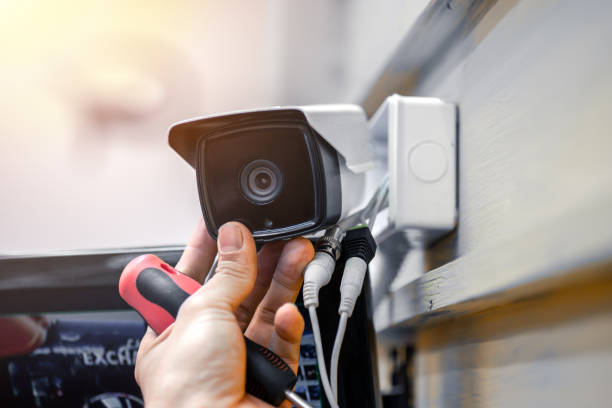The Top 6 Things To Consider When Installing Cctv Cameras

Security cameras are among the most significant inventions of technology.
CCTV cameras can be a useful instrument to combat criminality and other elements
of the antisocial which are increasing in cities.
While CCTV installation is most popular in shops and offices, recent years
have seen an rise in the number of home CCTV installations. Many people still
require help on how to install CCTV cameras despite their increasing popularity.
We advise you to not do it yourself. While it is possible to install a security
camera system yourself, it can be laborious. In addition, you are more likely to
fail in a CCTV installation, which can result in poor coverage, inadequate
storage and insufficient control. Professionals will take care of these issues
and be assured that you have the best setup possible for your
requirements.
It is important to remain careful when hiring an expert to set up your CCTV
system. Below, we've provided a list of the most basic but crucial things that
you should consider when installing CCTV security camera installation in your
office or at home.
1. Insurance
It is important to identify which areas are most vulnerable and should be
protected. The company that installs CCTV will assign an analyst to help figure
out the best possible location to mount cameras and get optimal coverage. It is
also possible to let the technician know if there is any particular area you
want the camera to protect.
2. Types of CCTV Cameras
Cameras for CCTV that are wireless are among the most frequently used cameras
in the present. They do not require the need to set up wires. They are also
simple to operate. However, they are not all Security Camera
Installation are alike. A traditional camera that is directional (also known
as bullet camera) is fixed, and can only point in one direction. Dome cameras,
typically found in corporate offices and malls, can provide 360-degree coverage.
You must consider the amount of coverage you want and the quality of the
camera.
3. Localities
This point is related to what we discussed earlier regarding coverage. It is
essential to take into consideration the areas that are vulnerable. You can also
use different cameras, based on the area. A camera placed outside the garage
door isn't identical to an indoor camera. This brings us to the next issue. Do
not overlook the indoor coverage. Criminals and thieves are getting more adept
at avoiding outdoor cameras. The coverage of a total camera can be compromised
by masked burglars. They don't have to see a camera in an indoor space. You can
avoid a lot of trouble by placing an indoor dome camera which is
low-light-capable.
4. Legality and Declaration
It is a legal requirement you inform the public that you're recording them.
This is particularly important in public areas such as offices or stores. A sign
that states that there are CCTV cameras on site will help. If you have an
security camera installation, you must inform any employees who come to your
house. If you want to monitor your maid (or visitors outside the door), they
must be informed by phone. A further thing to keep in mind is that it is
absolutely illegal to install CCTV cameras in private areas such as bathrooms.
In the event of such an offense you could be sentenced to prison.
5. Permissions
Depending on where you'll conducting a CCTV installation, you may need
permission from the appropriate authorities. It is an act of goodwill although
it's not legally required. If you are installing CCTV cameras outside your home
or shop, chances are that they are covering a part of the neighbor's house or
shop. If they're not comfortable with the cameras, inform them. It is important
to inform your local civic society (e.g. RWA) before installation. Home CCTV
installation in apartment blocks usually requires permission too.
6. Technical Aspects
You'll have to find some technical details about your security system. Make sure that your cameras are able to record HD videos. Consider the equipment that you will need. A majority of CCTV installations are supported by storage and recording equipment. Many offer cloud storage which allows you to store the recorded video online. Local storage is done using a hard disk similar to a computer or laptop. Your laptop's hard disk has distinct hard disks from the camera's. The hard disk contains a larger capacity and can run continuously for longer periods of time. That said, they also have to be replaced periodically. So, you need to choose the time frame for which you will keep any reordered videos.
MaxSol Techs
0455 66 55 80
info@maxsol.com.au
Cranbourne, 3977 Victoria
Comments
Post a Comment